Unit 6 Space and beyond Using language listening课件(共19张)外研版(2019)选择性必修 第四册
文档属性
| 名称 | Unit 6 Space and beyond Using language listening课件(共19张)外研版(2019)选择性必修 第四册 | 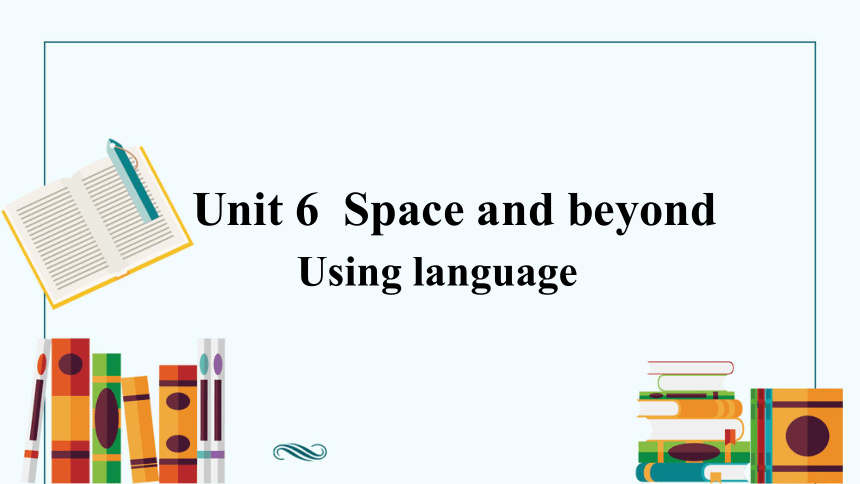 | |
| 格式 | pptx | ||
| 文件大小 | 1.1MB | ||
| 资源类型 | 教案 | ||
| 版本资源 | 外研版(2019) | ||
| 科目 | 英语 | ||
| 更新时间 | 2025-04-29 20:02:00 | ||
图片预览

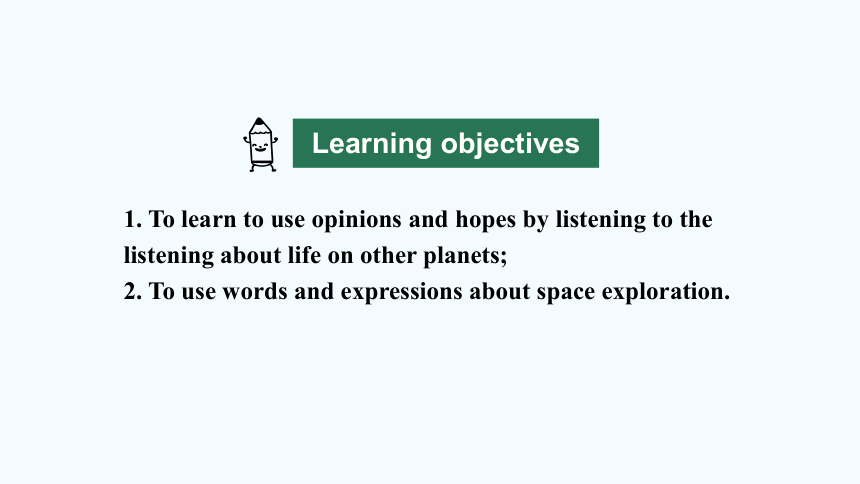
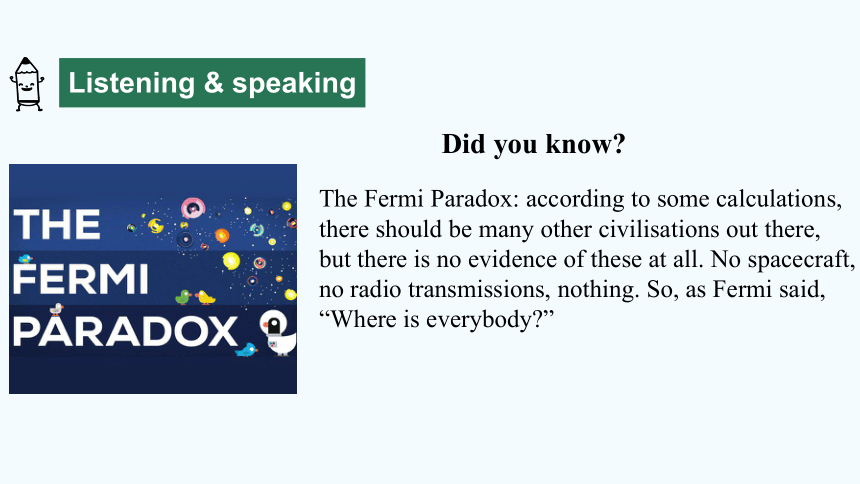
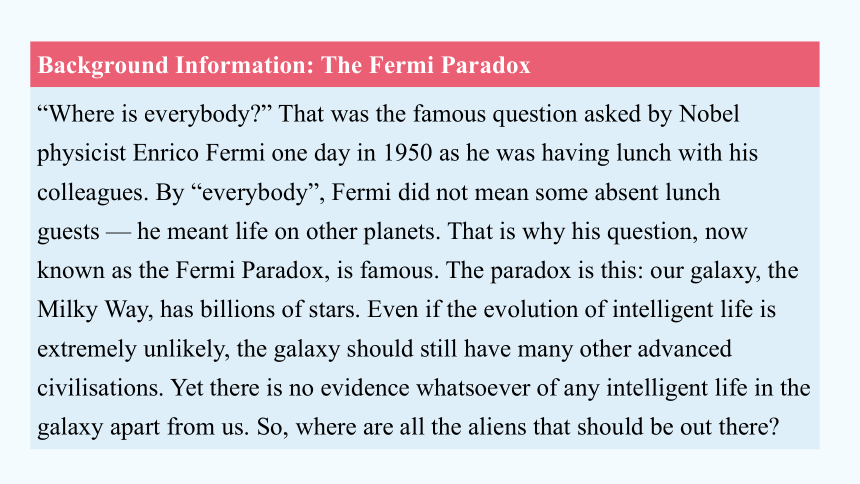
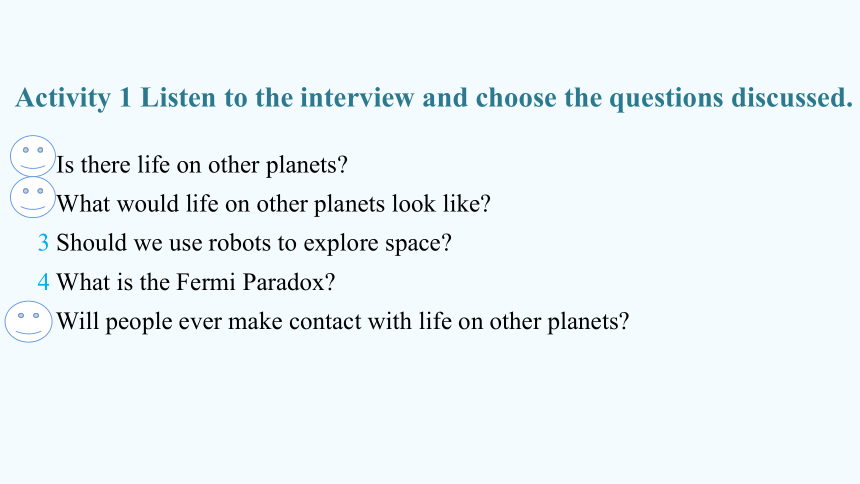
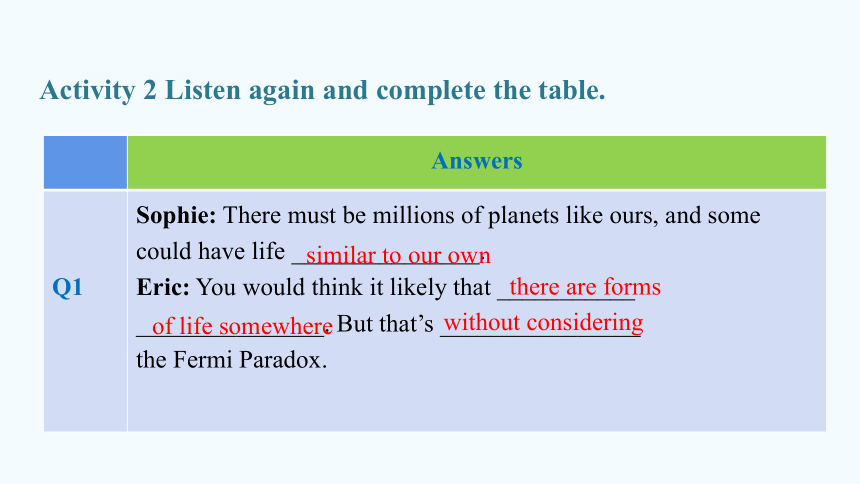
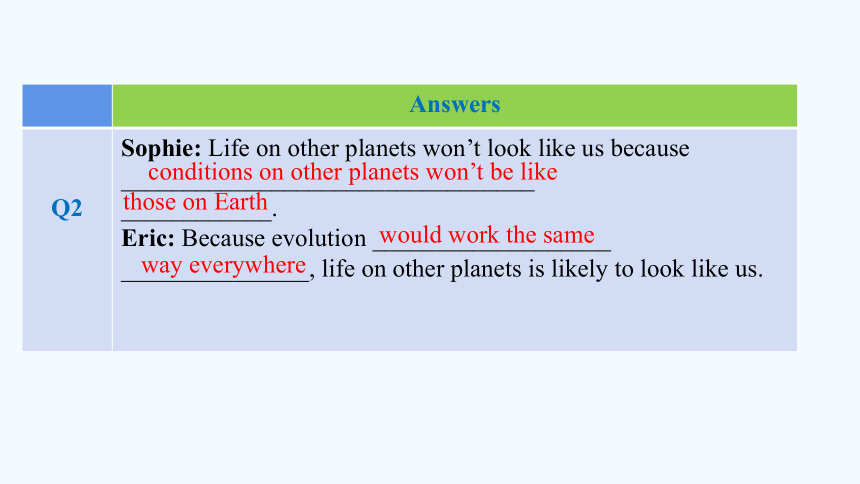
文档简介
(共19张PPT)
Using language
Unit 6 Space and beyond
Learning objectives
1. To learn to use opinions and hopes by listening to the listening about life on other planets;
2. To use words and expressions about space exploration.
The Fermi Paradox: according to some calculations, there should be many other civilisations out there, but there is no evidence of these at all. No spacecraft, no radio transmissions, nothing. So, as Fermi said, “Where is everybody ”
Did you know
Listening & speaking
Background Information: The Fermi Paradox
“Where is everybody ” That was the famous question asked by Nobel physicist Enrico Fermi one day in 1950 as he was having lunch with his colleagues. By “everybody”, Fermi did not mean some absent lunch guests — he meant life on other planets. That is why his question, now known as the Fermi Paradox, is famous. The paradox is this: our galaxy, the Milky Way, has billions of stars. Even if the evolution of intelligent life is extremely unlikely, the galaxy should still have many other advanced civilisations. Yet there is no evidence whatsoever of any intelligent life in the galaxy apart from us. So, where are all the aliens that should be out there
Activity 1 Listen to the interview and choose the questions discussed.
1 Is there life on other planets
2 What would life on other planets look like
3 Should we use robots to explore space
4 What is the Fermi Paradox
5 Will people ever make contact with life on other planets
Activity 2 Listen again and complete the table.
Answers
Q1 Sophie: There must be millions of planets like ours, and some could have life _______________.
Eric: You would think it likely that ___________ _______________. But that’s ________________
the Fermi Paradox.
similar to our own
there are forms
of life somewhere
without considering
Answers
Q2 Sophie: Life on other planets won’t look like us because _________________________________
____________.
Eric: Because evolution ___________________
_______________, life on other planets is likely to look like us.
conditions on other planets won’t be like
those on Earth
would work the same
way everywhere
Answers
Q3 Sophie: We cannot __________________, which meants it would take more than a lifetime to reach planets where there might be life.
Eric: Maybe we don’t need to travel in straight lines. Perhaps we will be able to ___________________________________
_________________ to make contact with life on other planets.
travel faster than light
take short cuts, through a “wormhole” in space, for example
Now work in groups of three and act out the interview.
Activity 3 Complete the boxes with the expressions from the interview.
I think there definitely is.
Since ..., it isn’t reasonable to ...
There’s evidence that ...
It would be wonderful if ...
The fact that … means ...
Let’s hope that …
have fun
Expressing opinions Expressing hopes
I think there definitely is.
Since ..., it isn’t reasonable
to ...
There’s evidence that ...
The fact that … means ...
It would be wonderful
if …
Let’s hope that …
The passage is about the Space Camp.
Activity 4 Work in pairs. Read the passage and answer the questions.
1. What is the passage mainly about
2. Would you like to take part in a space camp Why or why not
Activity 5 Read the advertisement for the space camp and find out what students can do there.
Vocabulary building
What students can do there:
At the observatory, you can learn about astronomy and take in a lunar eclipse. You will also have the chance to design and launch a model rocket. Then in modern flight simulators, you could put on a spacesuit, exit the capsule and go on your incredibly lifelike spacewalk in a world with zero gravity.
0,000 people reading my blog! b I love to photograph the rising sun, …
1. observatory ______________
2. lunar eclipse ______________
3. launch a model rocket ______________
4. put on a spacesuit ______________
5. capsule ______________
6. spacewalk ______________
7. zero gravity ______________
8. space sick ______________
月食
发射模拟火箭
穿上太空服
Pay attention to the words and expressions in bold.
天文台
太空舱,航天舱
太空行走
零重力,失重
太空病
Activity 6 Complete the email with the correct form of the words and expressions in Activity 5.
Dear Ted,
Remember when I told you I’d signed up for the space programme Well I just got back from a week of simulated manned flight activities, and it was awesome!
We started out with some theory, learning about astronomy in the ____________ and then _________ model rockets. After that we tried the simulator. I put on a _________ and went for a walk in _________________________.
observatory
launched
spacesuit
a world with zero gravity
It’s strange to float around like that — in fact, a lot of people get ___________! Luckily, I felt fine. Then I returned to the __________ and travelled to the “Moon” for some lunar exploration. You should join the programme too — you’d love it!
Write soon!
Yours,
Kim
space sick
capsule
0,000 people reading my blog! b I love to photograph the rising sun, …
1. Why do you want to take part in the programme
2. What activities would you like to experience
3. What is it about space that most interests you What have you learnt about it
Activity 7 Imagine you are going to apply for the programme. Organize your ideas for the short video by answering the questions.
Activity 8 Present your ideas for the short video in class using the words and expressions in this section.
Using language
Unit 6 Space and beyond
Learning objectives
1. To learn to use opinions and hopes by listening to the listening about life on other planets;
2. To use words and expressions about space exploration.
The Fermi Paradox: according to some calculations, there should be many other civilisations out there, but there is no evidence of these at all. No spacecraft, no radio transmissions, nothing. So, as Fermi said, “Where is everybody ”
Did you know
Listening & speaking
Background Information: The Fermi Paradox
“Where is everybody ” That was the famous question asked by Nobel physicist Enrico Fermi one day in 1950 as he was having lunch with his colleagues. By “everybody”, Fermi did not mean some absent lunch guests — he meant life on other planets. That is why his question, now known as the Fermi Paradox, is famous. The paradox is this: our galaxy, the Milky Way, has billions of stars. Even if the evolution of intelligent life is extremely unlikely, the galaxy should still have many other advanced civilisations. Yet there is no evidence whatsoever of any intelligent life in the galaxy apart from us. So, where are all the aliens that should be out there
Activity 1 Listen to the interview and choose the questions discussed.
1 Is there life on other planets
2 What would life on other planets look like
3 Should we use robots to explore space
4 What is the Fermi Paradox
5 Will people ever make contact with life on other planets
Activity 2 Listen again and complete the table.
Answers
Q1 Sophie: There must be millions of planets like ours, and some could have life _______________.
Eric: You would think it likely that ___________ _______________. But that’s ________________
the Fermi Paradox.
similar to our own
there are forms
of life somewhere
without considering
Answers
Q2 Sophie: Life on other planets won’t look like us because _________________________________
____________.
Eric: Because evolution ___________________
_______________, life on other planets is likely to look like us.
conditions on other planets won’t be like
those on Earth
would work the same
way everywhere
Answers
Q3 Sophie: We cannot __________________, which meants it would take more than a lifetime to reach planets where there might be life.
Eric: Maybe we don’t need to travel in straight lines. Perhaps we will be able to ___________________________________
_________________ to make contact with life on other planets.
travel faster than light
take short cuts, through a “wormhole” in space, for example
Now work in groups of three and act out the interview.
Activity 3 Complete the boxes with the expressions from the interview.
I think there definitely is.
Since ..., it isn’t reasonable to ...
There’s evidence that ...
It would be wonderful if ...
The fact that … means ...
Let’s hope that …
have fun
Expressing opinions Expressing hopes
I think there definitely is.
Since ..., it isn’t reasonable
to ...
There’s evidence that ...
The fact that … means ...
It would be wonderful
if …
Let’s hope that …
The passage is about the Space Camp.
Activity 4 Work in pairs. Read the passage and answer the questions.
1. What is the passage mainly about
2. Would you like to take part in a space camp Why or why not
Activity 5 Read the advertisement for the space camp and find out what students can do there.
Vocabulary building
What students can do there:
At the observatory, you can learn about astronomy and take in a lunar eclipse. You will also have the chance to design and launch a model rocket. Then in modern flight simulators, you could put on a spacesuit, exit the capsule and go on your incredibly lifelike spacewalk in a world with zero gravity.
0,000 people reading my blog! b I love to photograph the rising sun, …
1. observatory ______________
2. lunar eclipse ______________
3. launch a model rocket ______________
4. put on a spacesuit ______________
5. capsule ______________
6. spacewalk ______________
7. zero gravity ______________
8. space sick ______________
月食
发射模拟火箭
穿上太空服
Pay attention to the words and expressions in bold.
天文台
太空舱,航天舱
太空行走
零重力,失重
太空病
Activity 6 Complete the email with the correct form of the words and expressions in Activity 5.
Dear Ted,
Remember when I told you I’d signed up for the space programme Well I just got back from a week of simulated manned flight activities, and it was awesome!
We started out with some theory, learning about astronomy in the ____________ and then _________ model rockets. After that we tried the simulator. I put on a _________ and went for a walk in _________________________.
observatory
launched
spacesuit
a world with zero gravity
It’s strange to float around like that — in fact, a lot of people get ___________! Luckily, I felt fine. Then I returned to the __________ and travelled to the “Moon” for some lunar exploration. You should join the programme too — you’d love it!
Write soon!
Yours,
Kim
space sick
capsule
0,000 people reading my blog! b I love to photograph the rising sun, …
1. Why do you want to take part in the programme
2. What activities would you like to experience
3. What is it about space that most interests you What have you learnt about it
Activity 7 Imagine you are going to apply for the programme. Organize your ideas for the short video by answering the questions.
Activity 8 Present your ideas for the short video in class using the words and expressions in this section.
